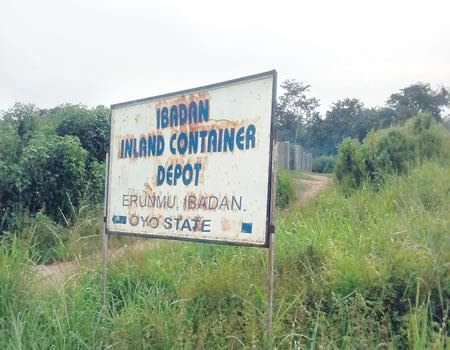
Many years ago, the Nigerian Shippers’ Council (NSC) embarked on a project to establish Inland Container Depots (ICDs) in the six geographical zones of the country. An ICD is equivalent of a sea port located in the hinterland. It receives containers by rail or road from the seaport for examination and clearance by customs and other relevant authorities. Like a sea port, it has all the loading and off-loading equipment needed to handle containers.
In articulating the need for ICDs in the country, the Shippers Council advanced several reasons why these facilities are crucial to Nigeria. These reasons were quite impeccable.
According to the Council, the establishment of ICDs, otherwise known as Container Freight Stations (CFS) in the designated areas would bring shipping services to the doorstep of shippers across the nation. It will assist in decongesting the seaports and make them more user-friendly as well as provide the much needed impetus to revive and modernize the railway as a primary mode for long distance haulage. The Council further argued that the initiative would also assist in bringing down the over-all costs of freighting cargo to hinterland destinations, and transit cargoes to landlocked countries.
In the document articulating the ICD project, the Council stressed that dry ports in Asia, North America, Pakistan, UAE and some African countries have contributed tremendously to the economic growth of those countries.
The Shippers Council’s argument was so robust that the Federal Executive Council (FEC) did not waste time in approving the project, which it said should be established on Public Private Partnership (PPP) basis.
Six locations were approved for the Inland Container Depots (ICDs) by the ICD Implementation Committee of the Federal Ministry of Transport, and concessioned to private sector operators. These locations include IsialaNgwa, Abia; Erunmu, Ibadan; Heipang, Jos; Zawachiki, Kano; Zamfarawa, Funtua; Jauri, Maiduguri and ICNL, Kaduna.
In addition to the six gazetted ICDs, the NSC said there were proposals from the private sector to establish ICDs at Dagbolu in Osun State, Lolo in Kebbi State, Onitsha in Anambra State and Ogwashi-Uku in Delta State.
The entire maritime industry was upbeat with expectations, especially importers in far-flung areas of the country. But, regrettably, over 16 years after, the project is yet to be delivered. In the process of promoting and facilitating these ICDs, the Shippers Council has spent enormous amount of money – mainly on seminars, sensitization workshops, consultancy services and other administrative activities including several trips.
Despite the huge expenses and the loud noise that has attended the initiative, all one has seen is motion without movement. The stakeholders have been kept waiting endlessly for the inland ports they thought would not take up to five years to come on stream, considering the sense of urgency evoked by the Shippers Council at the onset.
At present, Nigerians hear of ICDs only when Kaduna ICD is mentioned – which happens to be outside the six ICDs being facilitated by the Nigerian Shippers Council. The Kaduna Inland Container Depot is the only operational and functioning Dry Port in Nigeria at the moment. This is because it is owned and promoted by a private firm, Inland Container Nigeria limited (ICNL), and the ICD had been in existence before the Shippers Council initiative, operating as a bonded terminal. The inland dry port was commissioned by President Buhari in 2017, and is now a port of origin and port of destination with International Maritime Code.
The Kaduna Inland Dry Port is a success story given its high volume of patronage and performance level. This is because the owners of the dry port is focused and business-minded. The company is focused on providing port services to the hinterland, leveraging on its expertise in bonded terminal operations, clearing and forwarding, logistics and transportation, and vast knowledge of the maritime industry.
Equipped to handle more than 29,000 containers per annum, the commencement of operations at the Kaduna ICD should have provided the Nigerian Shippers Council the impetus to drive the remaining six inland ports that have remained moribund. This is more so given that for some years now, the Lagos ports access roads have been suffering untold congestion as a result of gridlocks.

With all the noise about the Ibadan Inland Dry Port and Chinese Construction Company mobilizing to site, the inland port is yet to be completed and put to use. The early 2021 that was being targeted as the delivery and commissioning date have come and gone, and the entire year is ending.
The Kano Inland Dry Port, another ICD where hope appears to be still alive, is still far from completion. The hope being talked about is hinged on the report that the state government was committing the sum of N2.4 billion to provide infrastructural facilities such as access road, water, electricity, telecom modes, etc., to ensure that the port meets global standard. But whether this money was actually released and how far the state government has gone with the provision of these facilities is still a matter of supposition.
The Isiala-Ngwa Inland Dry Port looks more or less like an abandoned project. Reports indicate that the site has been overgrown with weeds, the MOU the state government reportedly signed with a Canadian investor in 2017 notwithstanding. The sorry state of the ICD project is not unconnected with a sham World Bank Enyimba City Project by the Abia State government which it wants Isiala Ngwa Dry Port to be aligned to.
In fact, the case of Isiala-Ngwa ICD makes the stakeholders ask why the Nigerian Shippers Council should allow state governments like Abia State to hijack its initiative. One expects that going by the set objectives of the ICDs as enunciated by the Council, and the fact that it is supposed to be a public-private sector initiative, state governments’ role should be only providing the land and infrastructural facilities, mainly roads. They are not supposed to dictate how the ICD project should be executed in their states.
It is the responsibility of the Shippers Council to ensure that all involved in delivering the ICD projects conform to international specifications/standards. The Council should resist any compromise with the states or the concessionaires as this may deny the port global accreditation.
All said, the six ICD projects being promoted by the Nigerian Shippers Council have been unnecessarily long in the making. By now, over 16 years after, all the ICDs ought to have become functional to decongest the seaports and deliver other benefits they are meant to deliver. The on-going railway rehabilitation in the country should have been an added tonic for a speedy completion of the projects.
Truly, Nigerians have heard enough promises about the potentials of the proposed inland dry ports. If the Nigerian Shippers Council is still serious with the ICD project, then let there be spirited efforts that will put an end to the endless wait. The ICDs have become rather belated.